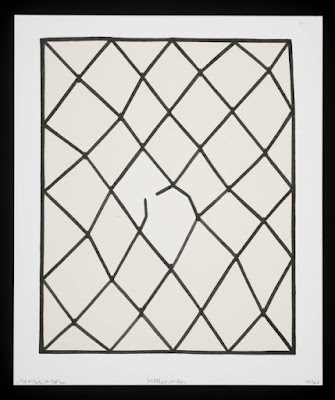 |
| Rebecca Baumann Window Work (Intersections and Notations) 2018 installation, with printed polyester film National Gallery of Victoria, Melbourne |
 |
| George Bellows The Window 1922 drawing Minneapolis Institute of Art |
 |
| Robert Adams Untitled ca. 1970-74 gelatin silver print Yale University Art Gallery |
 |
| James Castle Model of Sash Window before 1977 cardboard and string Minneapolis Institute of Art |
 |
| Patrick Caulfield Small Window 1969 screenprint Tate Gallery |
 |
| Howard Bond Staircase, Vienna 1976 gelatin silver print Chrysler Museum of Art, Norfolk, Virginia |
 |
| Frederick Crace Window Alcove for the Royal Pavilion, Brighton 1802 watercolor Cooper Hewitt, Smithsonian Design Museum |
 |
| Paul Damsté Venster 2006 drawing, with watercolor Teylers Museum, Haarlem |
 |
| William Henry Fox Talbot Oriel Window, South Gallery, Lacock Abbey ca. 1835 salted paper negative Metropolitan Museum of Art, New York |
"This mysterious view through the diamond-paned orel window of Talbot's home is one of the earliest photographs in existence – a remarkable relic of the inventor's earliest attempts to make pictures solely through the action of light and chemicals. He brushed a piece of writing paper with salt and silver nitrate and placed it in a small wooden camera stationed on a mantel opposite the window for an exposure that may have lasted hours. The image is tonally reversed – a negative, though the term did not yet exist – as the paper darkened most where it recorded the bright light of the window."
 |
| Carole Seborovski Sky Cloud Window 1984 drawing, with gouache and collage Princeton University Art Museum |
 |
| Ancient Roman Culture Window Pane (with broken corner) 1st-3rd century AD glass Museum of Fine Arts, Boston |
 |
| Brett Weston Broken Window 1974 gelatin silver print Phillips Collection, Washington DC |
 |
| Minor White Fillmore District, San Francisco 1959 gelatin silver print Princeton University Art Museum |
 |
| Paul Partos Window Obstruction 1986 engraving and drypoint National Gallery of Victoria, Melbourne |
 |
| Georgie Hopton The Little Window 2008 silkscreen Tate Gallery |
 |
| Roger Fenton Fountains Abbey, East Window ca. 1854 albumen silver print Getty Museum Los Angeles |
The People on the Bus
We have had our lives.
The reservoir visible
In the window beside our elbows, and the willow
Branches trailing at our stop
Are the nature we leave
Behind us gladly, since it has no place
In the window beside our elbows, and the willow
Branches trailing at our stop
Are the nature we leave
Behind us gladly, since it has no place
For all we have recently learned: that sex
Is temporary, help
Ours to hand down now, and materials science
Not the only kind. We thank
Calm, careful Minerva, goddess
Of adults, who for so many years took us
To school: her voice the timbre of fretless bass,
Her eyes the color of pencil lead, she taught
Us how to behave in order to have our rewards
In twenty years. We have them, and if we wish
Too often, this fall, to have led another life
We do not mean that we would give up ours:
Though we stand in a row and sway
Before an obstructed view, we are able to find
Initials outlined in the crosshatched trees,
And pebbles – calculi – around our ponds
And cherish them; we like to watch the roads
Along which the perennial pollen sifts down
As finely as ever, making a soft powder
Of brass amid the troughs in softball fields.
Our skills are finally in demand.
If you mock us, Pan,
In whom we also believe, do it
As gently as you can.
– Stephanie Burt (2013)